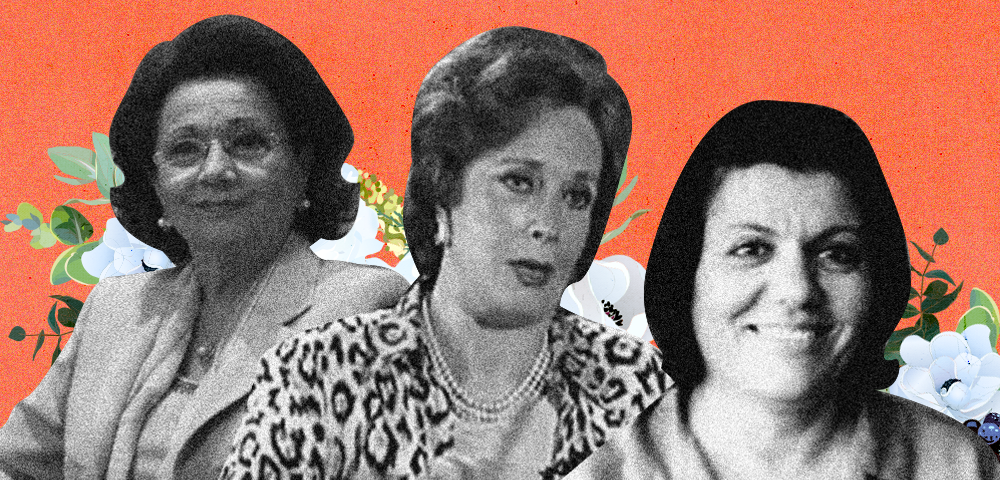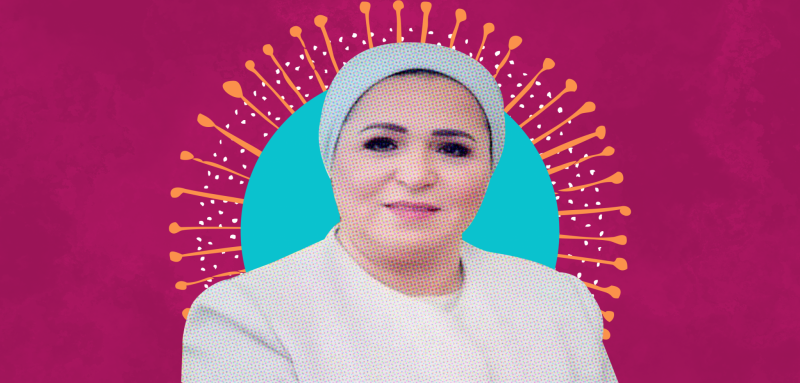After nearly seven years of Abdel Fattah al-Sisi in the Presidency, his wife Entissar al-Sisi made a rare media appearance in a first-ever televised interview, which centered on the domestic and familial aspects of her husband's life.
The president’s wife did not touch upon any national projects or political roles she intends to take on as First Lady.
Entissar al-Sisi’s complete disregard of the public interest and her focus on her role as a wife and mother has left many in Cairo wondering what type of approach she really takes as a first lady; the silent or the influential, the quiet or the compelling?
Entissar al-Sisi’s complete disregard of the public interest and her focus on her role as a wife and mother has left many in Cairo wondering what her approach really is: influential, silent or compelling?
Projects Of Leading Ladies
Ever since the rule changed from monarchy to republic in 1952, and decades before al-Sissi came to rule, Egypt has seen five presidents rise to power, two of which had barely remained one year in office before they were arrested. It is therefore difficult to judge the nature of their wives’ activities due to their short terms in office.
These two former presidents’ first ladies are Aicha Labib - wife of General Mohammed Naguib - and Naglaa Mahmoud - wife of Mohamed Morsi.
Whereas the remaining three - Tahia Abdel Nasser, Jehan Sadat, and Suzanne Mubarak - had played varying roles during the height of their authority.
Gamal Abdel Nasser, the first Egyptian president, made sure to keep his wife Tahia away from the public eye. For the man who came to eradicate the bourgeoisie and feudalism saw that it would not make much sense for his wife to appear as one of the "ladies” (or Hawanem) of the elite class that he and his companions had joined forces against.
Abdel Nasser decided that the woman who will appear with him in official events - such as in the reception of delegations and in international forums and gatherings – would be Minister of Social Affairs Dr. Hikmat Abu Zayd. Nicknaming her the "Merciful Heart of the Revolution", Abdel Nasser appointed her to the first woman minister. She could even be considered the country’s unofficial first lady during Abdel Nasser's rule.
The irony here is that Abu Zayd later had her Egyptian citizenship revoked during the reign of Anwar Sadat, due to political disputes between her and the ruling authority following the signing of the Camp David Accords.
Whereas the western title ‘First Lady of Egypt’ - copied from the United States - was officially first recognized by the country while referring to Jehan Sadat, who had inherited her western features from her English mother. This all came as Sadat steered the country towards Washington and adopted an open capitalist approach, as opposed to Abdel Nasser’s socialist vision.
Entissar al-Sisi remained on middle ground, for she is neither Suzanne Mubarak nor Jehan Sadat - experts in the language and causes of the elite - nor is she Tahia Abdel Nasser, who lived and died in the shadows, hidden and unseen
Egypt’s Jehan Sadat stood out in a brilliant public image no less dazzling than that of the female counterparts in the West. Her attractive features and proficiency in English were not sufficient to create the Western-style image of the first lady that had been hoped for.
In turn, she had to take on a more active social role and adopt a development project that would be tied to her name to help establish her position within the hearts of Egyptians as the country’s beloved first lady.
From here came the main path she adopted in support of women’s rights causes and those with disabilities, by organizing "family welfare" campaigns, and working to deploy its centers throughout most villages.
She also worked on new amendments to the country’s personal status laws in favor of women's rights, giving the wife the right to file a lawsuit for alimony and custody of children in the event of divorce, also requiring a husband to inform his wife ahead of registering for divorce. These laws came to be known as "Jehan's Laws" and remain so to date.
For those with disabilities, she founded the “al Wafa' Wal Amal (Faith and Hope) Rehabilitation Center”, which offers disabled war veterans medical and rehabilitation services as well as vocational training to help find suitable jobs for them.
The project proved quite successful in its endeavors and became a lifeline for many people with disabilities. As a result, this reflected well on Jehan Sadat’s public image and greatly improved her popularity.
When Mubarak came to power, his wife Suzanne followed in Jehan’s footsteps and adopted her approach, even though she searched for ways to help her step out from under Jehan’s long shadow, which had her issuing orders to ban the appearance of the former first lady on tv screens.

Suzanne Mubarak – or the people planning for her – decided that children and culture are the way to go in order to establish her name and status as the country’s first lady. By chairing the National Council for Childhood and Motherhood (NCCP), she was successful in eradicating polio, a disease that had plagued many Egyptian families for long decades. This successful achievement counted in her favor and improved her stature.
But the greatest and most notable success still tied to her name to this day came from her interest in culture and reading, after she established “Maktabet al-Osra” (the Family Library) and launched the “Reading for All” initiative. These two cultural and educational projects worked cohesively to encourage reading among the public, specifically the youth and budding generations, by providing public libraries in residential neighborhoods and printing prominent books at affordable prices.
Suzanne Mubarak's project succeeded in creating a young generation attached to books and reading. To this day, the project remains operational, and she is credited for its achievements even if her picture is no longer printed on the books’ covers.
Entissar Al-Sisi… An Alternate Form
Meanwhile, the current first lady Entissar al-Sisi represents an alternate format quite different from her predecessors. She is neither Jehan Sadat nor Suzanne Mubarak with the western features and fine etiquette.
On the contrary, she is the complete opposite, an example of a typical Egyptian woman when it comes to her physical features, sense of fashion, and her headscarf. She is a sample that represents the women of Egypt’s middle class.
It seems Entissar al-Sisi plays the role of the supportive wife occupied with her children's and grandchildren's lives. Her participation in the public scene will not extend beyond the role of smiling by her husband’s side, like most Egyptian women
If both Jehan and Suzanne possess charisma and the ability to confront cameras comfortably, then Entissar al-Sisi beats them with how closely relatable she is to Egyptian women, who, for the first time, are seeing a first lady that “resembles them".
A brief glimpse at the comment section on social media sites reveals that the ordinary appearance of Entissar and her dialogue on simple matters regarding her husband, children, and home - like any other Egyptian mother - has achieved a tangible impact on a large portion of the public that Suzanne Mubarak could not represent in any way.
The person behind Entissar al-Sisi’s recent debut to the public is well aware of this fact, and that she will also provide a positive addition to Sisi’s credit in the eyes of many within the nation, which is something that has already been achieved.
So far, it looks like the main approach of the presidential administration is for Entissar al-Sisi to remain on middle ground, for she is neither Suzanne Mubarak nor Jehan Sadat - experts in the language of the elite and the community projects tied to their names - nor is she Tahia Abdel Nasser, who lived and died in the shadows hidden and unseen.
In seems Entissar is going to play her actual role in domestic life when it comes to the political scene, as a wife supporting her husband and involved in her children's and grandchildren's affairs. Her participation in the public scene will not extend beyond the role of smiling by her husband’s side, as most regular women in this society do, and it’s a role many are happy to see themselves in, while inhabiting the presidential palace.
Raseef22 is a not for profit entity. Our focus is on quality journalism. Every contribution to the NasRaseef membership goes directly towards journalism production. We stand independent, not accepting corporate sponsorships, sponsored content or political funding.
Support our mission to keep Raseef22 available to all readers by clicking here!
Interested in writing with us? Check our pitch process here!



